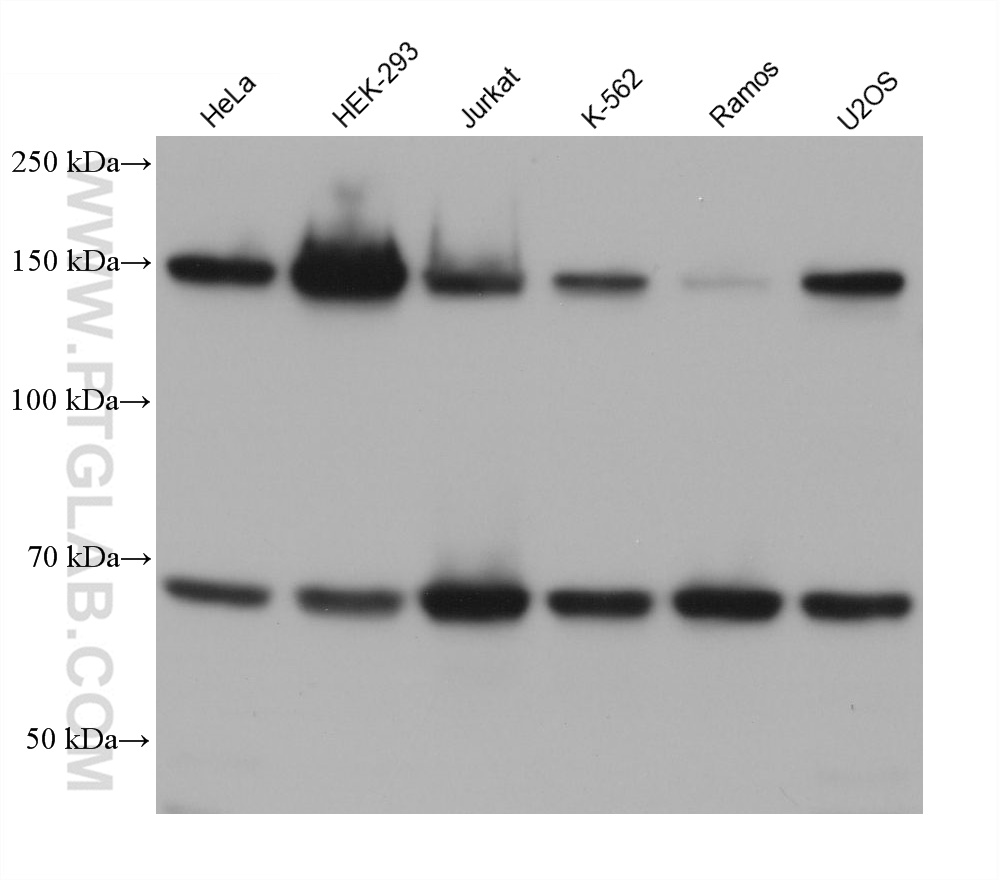验证数据展示
经过测试的应用
| Positive WB detected in | HeLa cells, HEK-293 cells, Jurkat cells, K-562 cells, Ramos cells, U2OS cells |
推荐稀释比
| 应用 | 推荐稀释比 |
|---|---|
| Western Blot (WB) | WB : 1:5000-1:50000 |
| It is recommended that this reagent should be titrated in each testing system to obtain optimal results. | |
| Sample-dependent, Check data in validation data gallery. | |
产品信息
68710-1-Ig targets NASP in WB, ELISA applications and shows reactivity with Human samples.
| 经测试应用 | WB, ELISA Application Description |
| 经测试反应性 | Human |
| 免疫原 | NASP fusion protein Ag1824 种属同源性预测 |
| 宿主/亚型 | Mouse / IgG1 |
| 抗体类别 | Monoclonal |
| 产品类型 | Antibody |
| 全称 | nuclear autoantigenic sperm protein (histone-binding) |
| 别名 | DKFZp547F162, FLB7527, FLJ31599, FLJ35510, NASP, PRO1999 |
| 计算分子量 | 788 aa, 85 kDa |
| 观测分子量 | 150 kDa, 70 kDa |
| GenBank蛋白编号 | BC010105 |
| 基因名称 | NASP |
| Gene ID (NCBI) | 4678 |
| RRID | AB_3670403 |
| 偶联类型 | Unconjugated |
| 形式 | Liquid |
| 纯化方式 | Protein G purification |
| UNIPROT ID | P49321 |
| 储存缓冲液 | PBS with 0.02% sodium azide and 50% glycerol , pH 7.3 |
| 储存条件 | Store at -20°C. Stable for one year after shipment. Aliquoting is unnecessary for -20oC storage. |
背景介绍
NASP (nuclear autoantigenic sperm protein) is associated with DNA replication, cell proliferation and cell cycle progression through functioning as a Histone H1 binding protein that mediates histone transport to the nucleus. NASP had two isoforms, tNASP (testis type) and sNASP (somatic type). The tNASP was mainly expressed in testis, a variety of malignant tumors, stem cells and embryonic tissues, while sNASP existed in all somatic mitosis cells. This antibody can recognize both isoforms.
实验方案
| Product Specific Protocols | |
|---|---|
| WB protocol for NASP antibody 68710-1-Ig | Download protocol |
| Standard Protocols | |
|---|---|
| Click here to view our Standard Protocols |
